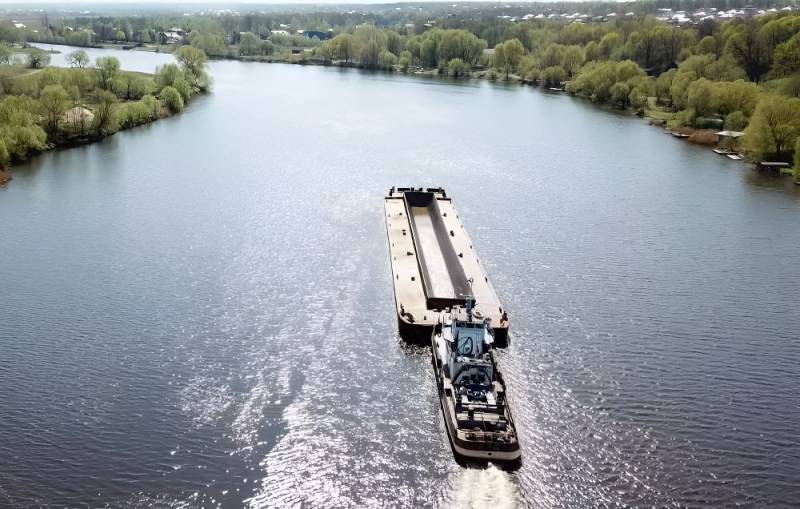Russian river transport "ran aground"
River (inland) transport includes the transportation of goods and passengers by ships along inland waterways. This type of transport in the Russian transportation system has a large, but currently untapped potential, with a very modest role in the national the economy. Despite this, it has high carrying capacity, the ability to transport bulky cargo, efficiency and low infrastructure costs.
For quite a long time, river transport played a very significant role in the history of our state, it was thanks to it that the development and subsequent development of new territories often took place. Currently, the key advantage of river transport can be considered the low cost of transportation compared to alternative options for transporting certain types of cargo. In many cases, this factor outweighs the possible negative consequences of using river transport associated with low speeds and the seasonal nature of transportation.
Based on the purpose of transportation, all river transport can be divided into freight and passenger. Each of these species has individual features and characteristics, so it is worth considering them separately, not forgetting that it is in the aggregate that they form a single system of inland river transport.
River freight transportation in Russia faced a whole range of new problems at the end of the last century, this was due to the collapse of the Soviet Union. Thus, in 1989, the volume of river transport amounted to more than 580 million tons. By 2014, the same indicator decreased by 4,6 times, dropping to 124,8 million tons. The Russian Federation is an order of magnitude behind European countries in terms of the share of water transport in the total volume of cargo transportation. For example, in the Netherlands, France and Germany, water transport accounts for more than 10%, while in the Russian Federation this figure for 2016 is less than 1,5%. It is also worth paying attention to the fact that such results are recorded, despite the much lower density of roads and railways in our country compared to European countries. This state of affairs suggests that even in the absence of alternative transport routes, river transport remains unattractive for many carriers.
Of the main factors that determined the sharp decline in the volume of river transport in Russia at the turn of the century, the following can be distinguished:
– Decrease in the economic competitiveness of river transport due to the deterioration of the infrastructure of inland waterways;
- many river routes simply fell out of the logistics chains for the delivery of goods that were formed during the Soviet Union, proving to be unprofitable or politically unprofitable in a market economy;
- high wear and tear of the river transport fleet and a deep crisis in the domestic shipbuilding industry.
A similar situation has developed in passenger river transport, but for somewhat different reasons. Thus, the volume of passenger transportation by inland water transport for the period from 1980 to 2020 decreased by 8 times - from 103 to 11 million people. At present, the potential of river transport for the transportation of passengers is practically not used, for example, in large agglomerations with inland waterways, but experiencing problems with road transport, expressed in road congestion, the launch of such routes would look quite effective. Despite all the negative trends, the role of inland river transport is still quite high in the regions of Siberia, the Far East and the Far North, where many settlements can only be reached in this way. However, it should be understood that the functioning of river transport in such entities directly depends on the amount of funding from the regional authorities. There is practically no way for the companies themselves that organize passenger transportation to be cost-effective without third-party support.
Things are a little better with the cruise fleet, which is used for river transportation for tourism purposes. Thus, the average age of ships operating on tourist routes is 41 years. The main advantage in the conditions of a rather strong isolation of the inhabitants of our country from the global tourism system can be the reorientation of domestic travelers from outbound tourist destinations to domestic ones, which in the future will have a positive impact on cruise companies.
In addition, passenger river transport in Russia is often characterized by a mismatch between the route network and the demand for transportation and the lack of synchronization with other types of passenger transport. Do not forget about the deplorable state of many infrastructure facilities (marinas, moorings and piers), which, combined with high prices for this type of tourism, often scares away many customers.
In February 2016, the country adopted the Strategy for the Development of Inland Water Transport for the period up to 2030, which lost its force in 2021 due to the approval of the Transport Strategy of the Russian Federation until 2030 with a forecast for the period up to 2035. Many of the provisions from the first document have become an integral part of the new strategy, they are aimed at leading out of stagnation, and in some places even out of the crisis, of the entire river transport system in the Russian Federation. It is too early to talk about its results, but some of its provisions look quite rational.
From the foregoing, we can conclude that the state should take measures to increase the competitiveness of river transport and try to create economically favorable conditions for the development and commissioning of innovative vehicles as soon as possible. Many experts note that domestic river transport has rather broad prospects, which are currently far from being fully realized. It must be clearly understood that if cardinal changes do not take place in this industry in the near future, then this type of transport may be irretrievably lost, completely disappearing from the transport system of the Russian Federation.

Information